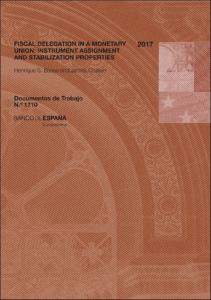Fiscal delegation in a monetary union : instrument assignment and stabilization properties
Autor
Fecha de publicación
28-mar-2017
Descripción física
60 p. : fórmulas, gráficos, tablas
Resumen
Motivado por la persistencia de los déficits públicos en muchos países de la UME, en contra de los compromisos de sus propias reglas fiscales, este papel estudia un régimen fiscal alternativo, según el cual cada país miembro delegaría el control de algún instrumento fiscal a una autoridad independiente que tendría la responsabilidad de evitar la acumulación de una deuda excesiva. Otras decisiones fiscales, como por ejemplo la composición del gasto público y la estructura de la imposición, quedarían bajo el control de los gobiernos de los estados miembros. Estudiamos el comportamiento a corto y a largo plazo del equilibrio de unos juegos dinámicos que sirven como modelos de posibles configuraciones institucionales para la unión monetaria. Delegar la responsabilidad de mantener la sostenibilidad fiscal produce ganancias importantes de bienestar, al disminuir notablemente la deuda de largo plazo. Además, reduce el coste de las fluctuaciones en la demanda de gasto público, a pesar de la «austeridad» con la que la autoridad fiscal responde a las perturbaciones fiscales
Motivated by the failure of fiscal rules to eliminate deficit bias in the euro area, this paper analyzes an alternative policy regime in which each Member State government delegates at least one fiscal instrument to an independent authority with a mandate to avoid excessive debt. Other fiscal decisions remain in the hands of member governments, including the allocation of spending across different public goods, and the composition of taxation. We study the short-and long-run properties of dynamic games representing different institutional configurations in a monetary union. Delegation of budget balance responsibilities to a national or union-wide fiscal authority implies large long-run welfare gains due to much lower steady-state debt. The presence of the fiscal authority also reduces the welfare cost of fluctuations in the demand for public spending, in spite of the fact that the authority imposes considerable “austerity” when it responds to fiscal shocks
Motivated by the failure of fiscal rules to eliminate deficit bias in the euro area, this paper analyzes an alternative policy regime in which each Member State government delegates at least one fiscal instrument to an independent authority with a mandate to avoid excessive debt. Other fiscal decisions remain in the hands of member governments, including the allocation of spending across different public goods, and the composition of taxation. We study the short-and long-run properties of dynamic games representing different institutional configurations in a monetary union. Delegation of budget balance responsibilities to a national or union-wide fiscal authority implies large long-run welfare gains due to much lower steady-state debt. The presence of the fiscal authority also reduces the welfare cost of fluctuations in the demand for public spending, in spite of the fact that the authority imposes considerable “austerity” when it responds to fiscal shocks
Publicado en
Documentos de Trabajo / Banco de España, 1710
Materias
Autoridad fiscal independiente; Delegación de instrumentos; Descentralización; Unión monetaria; Deuda soberana; Independent fiscal authority; Delegation; Decentralization; Monetary union; Sovereign debt; Política monetaria; Cooperación e integración monetarias; Política fiscal
Aparece en las colecciones:












